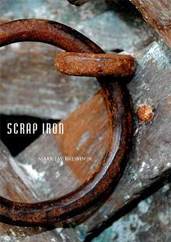Mark Jay Brewin, Jr. dares his audience to pontificate the world and relationships around them in his stunning work of poetry Scrap Iron. Written with a narrative voice, these poems are less like traditional poetry and more like beautifully detailed, deeply personal stories that explore the complexities of familial relationships and the desire to be elsewhere. Broken into three parts, there is a clear beginning middle and end to this book of poetry that is lacking in other similar works. Rather than leaving the reader empty and unfulfilled, the carefully comprised structure of this book ends with the reader left in a state of deep thought and satisfaction. Scrap Iron, winner of the Agha Shahid Ali Prize in Poetry, begins with a focus on the small town, blue collar lifestyle experienced by the author. There is a strong focus on his father and what it means to be a man in the working class, providing the reader with a sense of reverence of his father’s hard work. Though with this reverence comes a feeling of displacement from the author. In many of his poems he is seen juxtaposed to his father rather than in unison with the man; he is reading and burying himself in facts of faraway lands while his father is working the land or working in the power plant nearby. This theme of the complexities of relationships between the author and those around him reverberates throughout the entire piece, especially in Part II of the book when the author finally gets the chance to explore the world about which he has heretofore only read.
Moving from Part I to Part II of the work, the reader can distinguish a difference in tone when the author makes remarks about his family. At this point, the narrator has gone abroad, experiencing firsthand the lands he read so much about. Though this travel comes with new perspectives about the world and those around him, leading some relationships to be strained such as those between himself and his brother and mother. This change in the dynamic of his relationships is further illustrated in Part III of the work where he returns from his travels and is back “home” with his family. While the narrator may come off at some times “holier than thou” in his descriptions of his globally ignorant family members, this is simply his lamenting over the fact that he will never truly fit in amongst his family. There will always be that gap in understanding the world differently from them due to his travels, readings and introspection. While Scrap Iron reads very much like a memoir about the family dynamic of the author after his travels, the work is also beautifully poetic in its descriptions and profoundly moving in its juxtapositions of facts about the land around the narrator with facts about his family members and how the two relate to one another. The metaphors used in this work are as intricate as they are gorgeously emotive and require a great attention to detail on the part of the reader. This in conjunction with the story that pushes the reader through the book makes for a thoroughly captivated audience left utterly fulfilled and deeply moved by the end of the work. Deserving of its title as the 2012 winner of the Agha Shahid Ali Prize in Poetry, Scrap Iron certainly won’t disappoint its readers.
0 Comments
Leave a Reply. |
Archives
April 2024
Categories
All
|
|
Glassworks is a publication of Rowan University's Master of Arts in Writing 260 Victoria Street • Glassboro, New Jersey 08028 glassworksmagazine@rowan.edu |
All Content on this Site (c) 2024 Glassworks
|


 RSS Feed
RSS Feed
